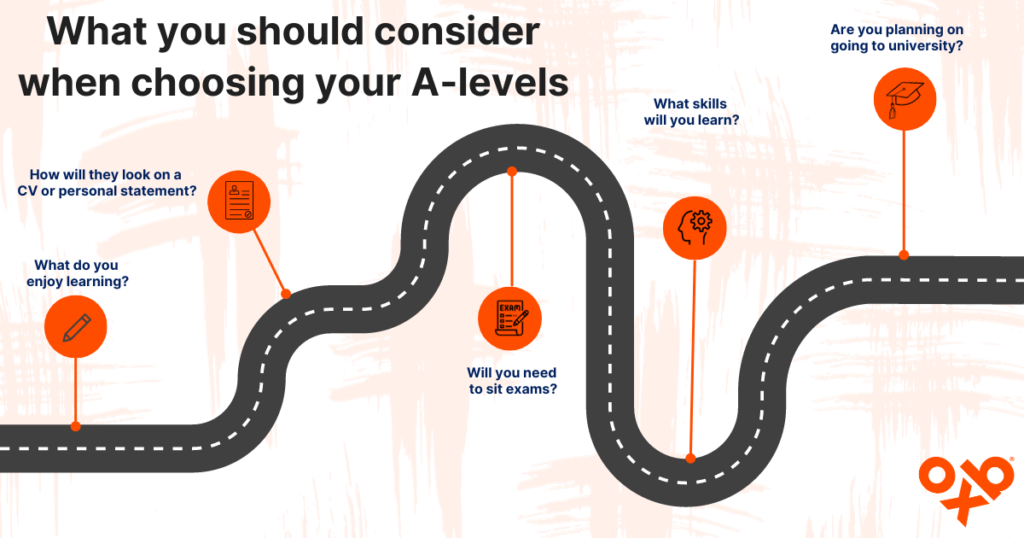A-levels are key qualifications for progressing on to university, further education, or into a career. Just like at GCSE, you have the opportunity to choose your subjects, and the decision you make is not one to rush.
This guide to choosing your A-levels will help you make that important first step and ultimately, set you on the way to the career you have dreamt of.
- What are A-levels?
- How many A-level choices can I make?
- Are there any compulsory subjects?
- How hard are A-levels?
- Which are the most popular A-levels?
- How do I choose the right A-levels for me?
- When do I need to make my A-level choices?
- What happens after choosing your A-levels?
- Can I sit my A-levels at any age?
- Can I study A-levels online?
- Will I need to sit exams?
- Ready to choose your A-levels?
What are A-levels?
A-levels, or Advanced Level Qualifications, are subjects taken from the age of 16 upwards. Most universities use them as part of the entry criteria for specific degrees, employment, and further study or training.

How many A-level choices can I make?
You will need to choose a minimum of three A-levels. Some students choose to take up to five subjects, however this depends on career pathway and academic ability, along with other factors. Most universities have three A-levels as a standard part of their entry criteria, though this can vary.
Are there any compulsory subjects?
There are no subjects that are compulsory with A-levels. The choice is completely up to you!
How hard are A-levels?
The step up to A-level from GCSE can be a challenge. You'll be expected to expand on the knowledge you have gained previously and apply it in new, often complex areas. For example, as part of A-level Maths, you will need to be confident with certain rules of algebra, in order to have an understanding of the advanced equations and formulae you'll encounter. Similarly, for essay-based subjects like English, your writing and analytical skills will be challenged throughout the course.
That is not to say A-levels are impossible. As long as you persevere and continue to work hard, with your tutor on hand to give you further support, you will be in the best possible position for success.
Which are the most popular A-level subjects?
Despite often being seen as one of the hardest A-levels, Maths remains one of the most popular subjects according to entry, accounting for around 11% of the total entries for 2023. Economics, too, has become one of the ten most popular courses, with more than 39 000 entries, with A-level Computing also seeing a surge of 16.7% more entries for 2023 than the previous year.
Subjects such as psychology, art & design, and history, all continue to be in the top ten most popular A-level choices, with English Literature regaining popularity after declines in recent years - around 601 000 entries were made for this subject in summer 2023, compared to 582 680 in summer 2022.

How do I choose the right A-levels for me?
There are a number of considerations to make when deciding on your A-levels. A key one is thinking ahead to your plans after finishing school - are you planning on going to university or other further study? Will you be going straight into a job or an internship? The answers you have to these questions will have a significant influence on the courses you choose, particularly if you have career ambitions in a specialist area, like healthcare or engineering for instance.
It is also worth considering the long-term skills you'll develop. How will they enable you to prosper in both a professional and personal sense? Are any of the skills transferable, like problem-solving from A-level Maths? And how will these look on your CV?
Choosing A-levels is not all about work, though; consider the subjects that you enjoy and are good at. While there is often a huge step up, it is definitely worth looking at how you did at GCSE and which subjects you had a genuine interest in. You'll be dedicating a lot of time and effort to them after all!

When do I need to make my A-level choices?
You will usually make your final decision in the last few weeks of Year 11. There is also a period where you can change your subjects if you feel that they are not right for you, but again, there is a lot to take into consideration here and you will naturally be playing catch-up from day one.
What happens after choosing A-levels?
You will study your A-levels for two years, after which you'll be able to apply to universities, should that be where you see yourself. You can also use A-levels when applying for apprenticeships, internships, or for getting onto further training programmes.
Can I sit my A-levels at any age?
You can! Whilst 16-18 is the typical age range for A-level study, they can be taken at any time. It is not uncommon for people to study A-levels later in life; it could be that they are returning to the classroom after raising a family or are looking to gain qualifications for a career change. Whatever the reason, age is no limitation!

Can I study A-levels online?
With the rise of distance learning, it is now possible to study your A-levels online. At Oxbridge for example, we provide A-levels across a range of subjects, from Maths and English, to languages, and even art and music.
Online learning is ideal if you need to retake your A-levels or find it hard studying in the traditional school environment. All your course materials can be accessed from any device with an Internet connection, meaning that you can fit studying around your other commitments or while on an apprenticeship, for instance.
Will I need to sit exams?
Most A-levels will require you to sit exams, though there are others that are more coursework-focussed. Make sure you speak with your tutor to help you decide whether the course you have in mind will suit your learning style and what you will be expected to learn for any exams.
Ready to choose your A-levels?
At Oxbridge, we're here to help you make the right choice for your future. Our A-levels all follow the latest course syllabuses from the UK's leading awarding bodies, with unlimited tutor support at every step of the way. If you're ready to start the next stage in your learning journey, talk to our learning advisers.

